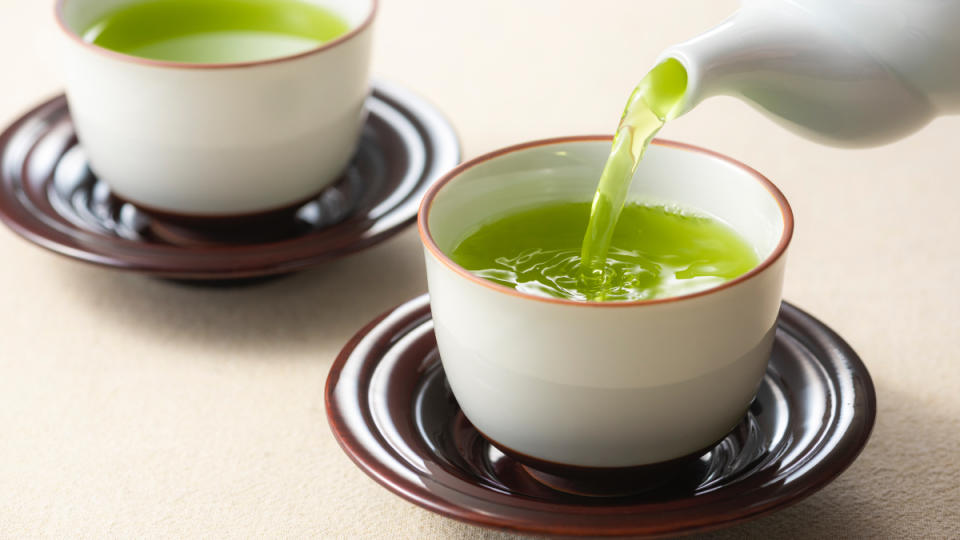Chronic Stress? Experts Say These Delicious Cortisol-Lowering Foods Can Help
Stressed and not feeling your best? High levels cortisol, your body's stress hormone, may be to blame. When this hormone is chronically elevated, it can contribute to everything from weight gain to depression. And while you may think that long bouts of exercise or complicated meditation rituals are the only way to bring it back down, luckily that's not the case. We've rounded up the most effective (and delicious!) cortisol-lowering foods that help tame tension and boost your health.
What is cortisol?
Cortisol is a hormone produced by the adrenal glands, which are located above each kidney. While we know cortisol as a stress hormone, it actually plays a role in several important bodily functions. It helps regulate metabolism, immune function, inflammatory response and your sleep-wake cycle, in addition to managing your stress response. (Click through to learn how to heal your adrenals and outsmart stress.)
“We have cortisol in our body for a reason, and it’s helpful at the right levels,” says Dawn Jackson Blatner, RD. “When you wake up in the morning, cortisol naturally surges in the body to make us alert and helps provide energy to tackle the day.”

SEBASTIAN KAULITZKI/Getty
The side effects of elevated cortisol
While cortisol benefits the body at normal levels — which fluctuates during the day — chronically elevated amounts of the hormone can dampen your health. Symptoms of higher-than-normal cortisol levels can include:
Weight gain
High blood pressure
High blood sugar, which can turn into Type 2 diabetes
Muscle weakness
Impaired immune system
Mood disorders
Elevated cortisol "can send signals to the different inflammatory pathways in the body to promote inflammation,” says Laura DeCesaris, IFMPC, DC, MSACN. “It can make people feel more tired during the day, and it can interfere with sleep hormones and the production of melatonin, which we need to sleep. It also can lead to lowered immune function, so people might find they get sick more often. And long-term elevations in cortisol are also associated with a higher risk of a lot of different chronic diseases.”
The top causes of elevated cortisol
Several factors can increase cortisol production and keep levels high longer than normal. The most obvious is stress. Constant tension and chronic worries causes the body to continually churn out cortisol.
“Where the needle tends to tip is when people are making a lot of cortisol all of the time because they're dealing with chronic stress, so they're not getting these short bursts of it,” Dr. DeCesaris explains. “It's chronic production, which sends a lot of different SOS signals to the body, that can wreak a lot of havoc long-term.”
Another big risk factor for elevated levels of the stress hormone is poor sleep. Everything from insomnia to sleep apnea to an inconsistent sleep schedule can ratchet up levels of cortisol. And finally, taking high doses of corticosteroids such as prednisone, prednisolone or dexamethasone can increase your cortisol production to an unhealthy level.

Related: Too ‘Wired and Tired’ To Fall Asleep? MDs Explain Why It Happens — And the Easy Fixes
The benefits of balanced cortisol
On the flip side, keeping your cortisol levels in check benefits your body from head to toe. “When you have the right level of cortisol, there are many important things it does in our bodies,” Blatner says. “Sure, it helps us respond to stress, but it also plays in a role in regulating our metabolism, helping inflammation, helping our immune system, regulating our blood pressure, regulating our blood sugar and helping control our sleep and wake cycle. It’s involved in a lot of stuff that's important.”
What to know about cortisol-lowering meds
There are a variety of prescription cortisol blockers, as well as over-the-counter supplements that claim to reduce production of the hormone, but these medications have some drawbacks.
Limited access: Prescription cortisol blockers such as osilodrostat, mitotane and mifespristone are generally only given to those experiencing Cushing syndrome, a disorder that occurs when the body makes too much cortisol over a long period of time.
Cost: Along with the price for the drugs themselves, prescription cortisol blockers can cost hundreds of dollars.
Side effects: Prescription cortisol blockers carry a risk of side effects that can include adrenal insufficiency, fatigue, nausea and headache, among others.
Questionable efficacy: Over-the-counter cortisol reducing supplements may be cheaper and easier to get than prescriptions, but the validity of some supplements have been questioned by the FTC.
The 5 best cortisol-lowering foods
Blatner says while there’s no one specific food that will regulate cortisol levels on its own, eating a balanced diet of regular meals will not only help keep stress hormones in check, but also contribute to overall wellbeing.
“Balance is key,” she says. “And also not skipping meals, because skipping makes people stressed out, and stress is what we're trying to avoid. So we are trying to eat regular meals that are balanced and not skip.”
When it comes to cortisol-lowering foods, these smart picks pack a powerful stress-relieving punch.
1. Green Tea
It feels so good to cozy up with a cup of green tea. And now we know why. Not only does the brew brim with catechins that reduce inflammation, it contains other healing compounds that tamp down cortisol production.
“Green tea has this nice calming compound called L-theanine in it, which helps reduce stress,” Dr. DeCesaris says.
In fact, L-theanine has also been shown to improve in mood, cognition and symptoms of anxiety, suggests a study in Plant Foods for Human Nutrition. Dr. DeCesaris says start with one cup of tea per day to get the benefits. (Click through to see how green tea helps with bloat, too.)

3. Yogurt and fermented foods
The gut-brain axis — the link between cognitive and emotional centers in the brain and the digestive system — plays an important role in stress management and cortisol production. One of the best ways to nourish your gut? By noshing on fermented foods such as yogurt, kefir, kimchi and sauerkraut. They pack plenty of gut-friendly bacteria that Blatner says helps regulate cortisol levels.
“Boosting that good bacteria ratio in your gut is important because when you're stressed out, you have something called dysbiosis, which is an imbalance of too much bad bacteria versus good," Blatner says. "So when you eat these fermented foods, they help reset your gut to have more good bacteria than the bad.”
Blatner says most people get no servings of fermented foods, so adding even one per day can be a good start. “Once you figure out what you like and how to add them in fun, delish ways, aim to get closer to 4 servings daily,” she says. (Click through to learn how to make your own probiotic-rich yogurt at home.)
3. Colorful fruits and veggies
Sure, it's common sense that fruits and vegetables are cortisol-lowering foods. Blatner says phytonutrients in fruits and vegetables help protect the body from stress. “These plant compounds can help refortify and restrengthen our bodies in these extreme times of stress,” she adds.
But it turns out the color of produce you eat can significantly boost the benefits. When getting the suggested 4-5 servings daily, it’s important to eat a rainbow of fruits and veggies — juicy oranges, roasted green beans, red delicious apples and so on. Each color provides a different nutrient makeup.
“It's not enough that you're like, ‘I eat broccoli every day,’ or ‘I eat berries every morning,’” Blatner says. “Those are good, but the variety is actually going to be more important.”

4. Avocado and healthy fats
Avocado toast anyone? Healthy fats, also known as monosaturated and polyunsaturated fats, are one of the best cortisol-lowering foods. The reason: They help support proper brain and nervous system function that's crucial to stress management.
“I recommend having a Mediterranean mindset, where the focus is on good fats such as olive oil, fish, nuts and seeds and avocado,” Blatner says. “Stress impacts our nervous system, and healthy fats help keep our nervous system function strong.”
Aim for one healthy fat per meal and about 15 oz. of fish per week to get the stress-busting benefits. (Tip: Have an avocado pit leftover from lunch? Don't toss it! Click through to discover what to do with an avocado pit, including the surprising ways it can save you time and money.)

5. Beans and lentils
Beans and lentils pack a beneficial one-two punch of fiber and plant protein that Blatner says improve gut health, promoting a healthier gut-brain axis that's better able to rein in cortisol produciton.
“It’s important to get enough plant protein,” she says. “Make sure that you think about having beans and lentils as some of your protein sources in your diet. And focusing on gut health also means a high-fiber diet.”
Blatner says to shoot for at least 30 grams of fiber and three cups of vegetables per day. Beans and lentils can contribute to reaching both goals. One cup of lentils has 16 grams of fiber, while a cup of beans can have nearly 30 grams on its own.
For more ways to outsmart stress:
This content is not a substitute for professional medical advice or diagnosis. Always consult your physician before pursuing any treatment plan.
